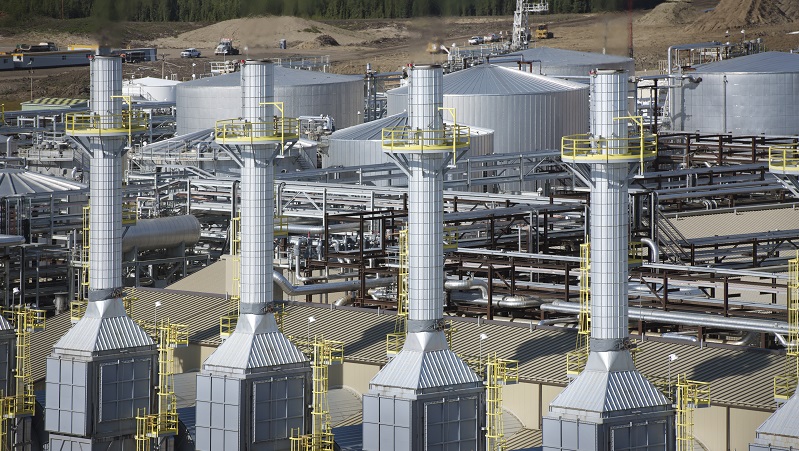Canadian tar sands producers are calling for larger subsidies to help them decarbonise their operations while reporting record profits following Russia’s invasion of Ukraine.
In its annual budget, Justin Trudeau’s government proposed to subsidise the development of projects to capture carbon dioxide from oil and gas production or combustion and permanently store it underground or in concrete for example.
Under the plan, oil and gas companies would be eligible for a 50% tax credit until 2030 for investing in carbon capture, utilisation and storage (CCUS) projects. This expected to cost the federal government $2.6 billion in the first five years — reaching up to $8.6 billion by 2030.
But companies producing some of the world’s dirtiest oil say it is not enough to convince producers to develop large-scale CCUS.
Germany to build LNG terminals at ‘Tesla speed’ in shift away from Russian gas
On Monday, Canadian tar sands producer MEG Energy Corporation posted record results in the first quarter of the year, with net earnings more than double that of the same period in 2021.
The next day, CEO Derek Evans told analysts that the Alberta government should top up the CCUS tax credit to cover 75% of the costs, leaving oil firms responsible for just 25% of the investments, the Financial Post reports.
Last week, Alex Pourbaix, CEO of tar sand firm Cenovus Energy, said companies will need “more help” from both the federal government and the Alberta government to go ahead with large-scale carbon capture and storage projects.
The same day, the company announced a sevenfold increase in its quarterly profits and a tripling of its dividends. Oil and gas companies are benefitting from soaring global energy prices as western buyers scramble to replace Russian supplies and defund the Kremlin’s war machine.
The industry’s stance has prompted outrage from Canadian environmentalists.
“Carbon capture is not a climate solution – it’s a greenwashing strategy used to justify more fossil fuel production,” Julia Levin, from the Environmental Defence Canada, told Climate Home.
“Oil and gas companies know these are dead-end technologies which won’t make a dent in emissions, but are using them anyway to delay the clean energy transition and get more taxpayer money into the pockets of executives and shareholders.”
Both MEG Energy and Cenovus are members of the Oil Sands Pathway Alliance, a group of six oil companies responsible for about 95% of Canada’s oil sands production committed to achieve net zero operational emissions by 2050. The target does not cover emissions from customers burning the oil.
The alliance has proposed to work on a CCUS project that it says could reduce CO2 emissions by 10 million tonnes per year by 2030 – the equivalent of emissions from more than two million combustion-engine cars driven for a year.
But that will require governments’ “co-investing alongside the industry,” it said in a statement welcoming the government’s tax credit proposal last month.
“Tar sands companies are swimming in cash, yet are only willing to reduce pollution if the taxpayer foots the bill,” Keith Stewart, senior energy strategist with Greenpeace Canada, told Climate Home.
“Rather than wasting public money on carbon capture subsidies for fossil fuels, Canadian governments should be going all in on renewable energy and the electrification of transport, heating and cooling.”
Environment minister Steven Guilbeault told the Canadian Press on Thursday that the federal government won’t be putting more money on the table. “These companies are making record profits, they should be investing some of them into ensuring that they have a future,” he said.
DR Congo approves auction of oil blocks in one of the world’s largest carbon sinks
Canada is one of five major oil producers to have signed up to the Net Zero Producers Forum, which committed to use strategies such as CCS to reduce emissions from oil production. Leaving oil in the ground is not one of them.
In fact, most of the captured carbon dioxide in Canada is used to extract more oil from depleted wells in a process known as enhanced oil recovery. This is not eligible for the Ottawa’s proposed tax credits.
A report by Environmental Defence Canada published in March estimates that, since 2000, subsidies for oil and gas companies to develop CCS amounted to $5.8bn: $2bn from the federal government and $2.6bn and $1.2bn from the oil producing provinces of Alberta and Saskatchewan respectively.
This resulted in a yearly capture rate of less than four million tonnes of CO2 – about 0.05% of Canada’s emissions, the report found.
Most of the proposed CCUS projects in Canada concern the production stage and wouldn’t help to reduce emissions from burning of the oil, which accounts for 80% of the emissions.
“There may be a role for carbon capture from hard-to-abate industrial applications, but not for traditional fossil fuels like the tar sands where it can at best address only a tiny portion of the pollution,” said Stewart.
The story was updated on 06/05/2022 to include comments from the environment minister.
